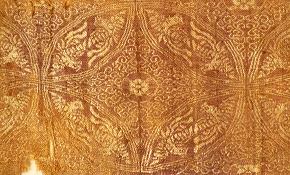| |
 mouse over to magnify mouse over to magnify
| | | | 088 Sumba, East Sumba
Hinggi (men's blanket)
| | Locale: | Rende | | Period: | Circa 1970 | | Panels: | 2 | | Design: | Midfield with motif lobeng, inspired by a type of ancient batik from Java called kain gringsing, similar to that found on Balinese geringsing pat likur isi. Also habbak motif, a prerogative of the nobility. Pagi-sore: top and bottom end different from one another. Large singha, lions, both sitting and standing, inspired by Dutch heraldics; udang, shrimp, andung, skull trees; tokeh, gekkos; and kalajengking, scorpions. | | Size: | 145 x 289 cm (57 x 113.7 in) | | Yarn: | Cotton, hand-spun, medium | | Comment: | Large hinggi with unique design, excellent execution. Lobeng motif also found on antique Javanese batik called gringsing, on shawls from Troso Jepara in north-central Java and on Balinese geringsing of the type pat likur isi. As Balinese nobility descended from nobles of the East-Javanese Majapahit empire, it is most likely that this motif came with them, and that Javanese cloths depicting it are not really imitating Balinese geringsing, but that influence in fact flowed in reverse direction. Most likely such grinsing, believed to provide immunity on the battlefield, were in possession of Sumbanese royalty, then imitated in ikat. See image below.

The original source most likely is much older, witness fragment of a Liao (11th C.) textile from Taiwan or southeast China, below. The central motif here is flanked by phoenixes. Note that ikat was introduced in Nusantara from Taiwan.
 | | Background: | Additional information in chapters on Sumba and East Sumba. | | Compare: | 058 059 060 | | Sources: | Similar pattern on Javanese batik in possession of Sulawesi royalty depicted in Barnes and Kahlenberg, Five Centuries of Indonesian Textiles, Plate 31. | | |
 ©Peter ten Hoopen, 2024
All rights reserved.
|
|


